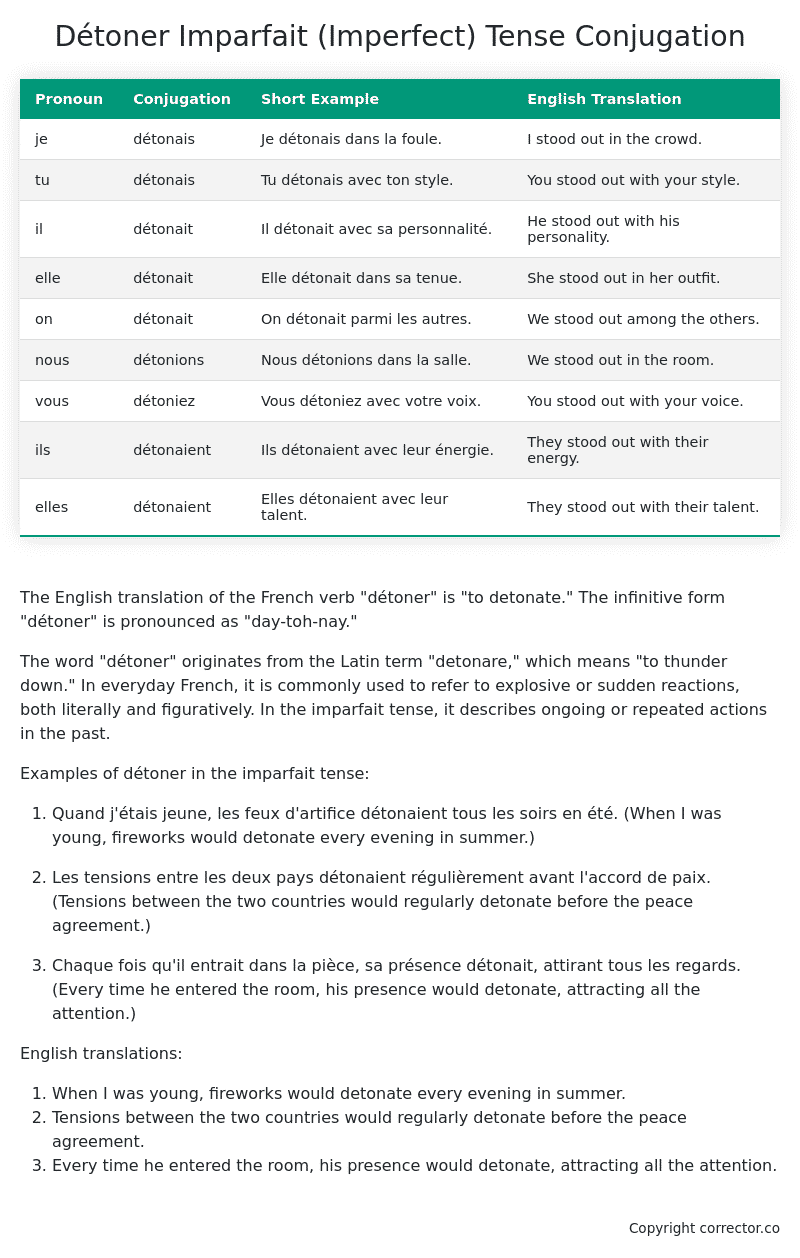Imparfait (Imperfect) Tense Conjugation of the French Verb détoner
Introduction to the verb détoner
The English translation of the French verb “détoner” is “to detonate.” The infinitive form “détoner” is pronounced as “day-toh-nay.”
The word “détoner” originates from the Latin term “detonare,” which means “to thunder down.” In everyday French, it is commonly used to refer to explosive or sudden reactions, both literally and figuratively. In the imparfait tense, it describes ongoing or repeated actions in the past.
Examples of détoner in the imparfait tense:
-
Quand j’étais jeune, les feux d’artifice détonaient tous les soirs en été.
(When I was young, fireworks would detonate every evening in summer.) -
Les tensions entre les deux pays détonaient régulièrement avant l’accord de paix.
(Tensions between the two countries would regularly detonate before the peace agreement.) -
Chaque fois qu’il entrait dans la pièce, sa présence détonait, attirant tous les regards.
(Every time he entered the room, his presence would detonate, attracting all the attention.)
English translations:
- When I was young, fireworks would detonate every evening in summer.
- Tensions between the two countries would regularly detonate before the peace agreement.
- Every time he entered the room, his presence would detonate, attracting all the attention.
Table of the Imparfait (Imperfect) Tense Conjugation of détoner
| Pronoun | Conjugation | Short Example | English Translation |
|---|---|---|---|
| je | détonais | Je détonais dans la foule. | I stood out in the crowd. |
| tu | détonais | Tu détonais avec ton style. | You stood out with your style. |
| il | détonait | Il détonait avec sa personnalité. | He stood out with his personality. |
| elle | détonait | Elle détonait dans sa tenue. | She stood out in her outfit. |
| on | détonait | On détonait parmi les autres. | We stood out among the others. |
| nous | détonions | Nous détonions dans la salle. | We stood out in the room. |
| vous | détoniez | Vous détoniez avec votre voix. | You stood out with your voice. |
| ils | détonaient | Ils détonaient avec leur énergie. | They stood out with their energy. |
| elles | détonaient | Elles détonaient avec leur talent. | They stood out with their talent. |
Other Conjugations for Détoner.
Le Present (Present Tense) Conjugation of the French Verb détoner
Imparfait (Imperfect) Tense Conjugation of the French Verb détoner (You’re reading it right now!)
Passé Simple (Simple Past) Tense Conjugation of the French Verb détoner
Passé Composé (Present Perfect) Tense Conjugation of the French Verb détoner
Futur Simple (Simple Future) Tense Conjugation of the French Verb détoner
Futur Proche (Near Future) Tense Conjugation of the French Verb détoner
Plus-que-parfait (Pluperfect) Tense Conjugation of the French Verb détoner
Passé Antérieur (Past Anterior) Tense Conjugation of the French Verb détoner
Futur Antérieur (Future Anterior) Tense Conjugation of the French Verb détoner
Subjonctif Présent (Subjunctive Present) Tense Conjugation of the French Verb détoner
Subjonctif Passé (Subjunctive Past) Tense Conjugation of the French Verb détoner
Subjonctif Imparfait (Subjunctive Imperfect) Tense Conjugation of the French Verb détoner
Subjonctif Plus-que-parfait (Subjunctive Pluperfect) Tense Conjugation of the French Verb détoner
Conditionnel Présent (Conditional Present) Tense Conjugation of the French Verb détoner
Conditionnel Passé (Conditional Past) Tense Conjugation of the French Verb détoner
Conditionnel Passé II (Conditional Past II) Tense Conjugation of the French Verb détoner
L’impératif Présent (Imperative Present) Tense Conjugation of the French Verb détoner
L’impératif Passé (Imperative Past) Tense Conjugation of the French Verb détoner
L’infinitif Présent (Infinitive Present) Tense Conjugation of the French Verb détoner
L’infinitif Passé (Infinitive Past) Tense Conjugation of the French Verb détoner
Le Participe Présent (Present Participle) Tense Conjugation of the French Verb détoner
Le Participe Passé (Past Participle) Tense Conjugation of the French Verb détoner
Struggling with French verbs or the language in general? Why not use our free French Grammar Checker – no registration required!
Get a FREE Download Study Sheet of this Conjugation 🔥
Simply right click the image below, click “save image” and get your free reference for the détoner imparfait tense conjugation!

Détoner – About the French Imparfait Tense
NOTE: To take a deep dive into all the French tenses then see our article on Mastering French Tense Conjugation.
Formation of the Imparfait Tense
For regular -er verbs:
For regular -ir verbs
For regular -re verbs
Common Everyday Usage Patterns
Description of Past Habits
Background Information
Mental and Emotional States
It’s employed to express emotions, thoughts, or physical sensations in the past. For example: “J’étais content quand il est arrivé.” (I was happy when he arrived.)
Ongoing Actions
Points to Note About the Imparfait Tense
Passé Composé vs. Imparfait
Conditional
Si Clauses
Narration
I hope you enjoyed this article on the verb détoner. Still in a learning mood? Check out another TOTALLY random French verb imparfait conjugation!


